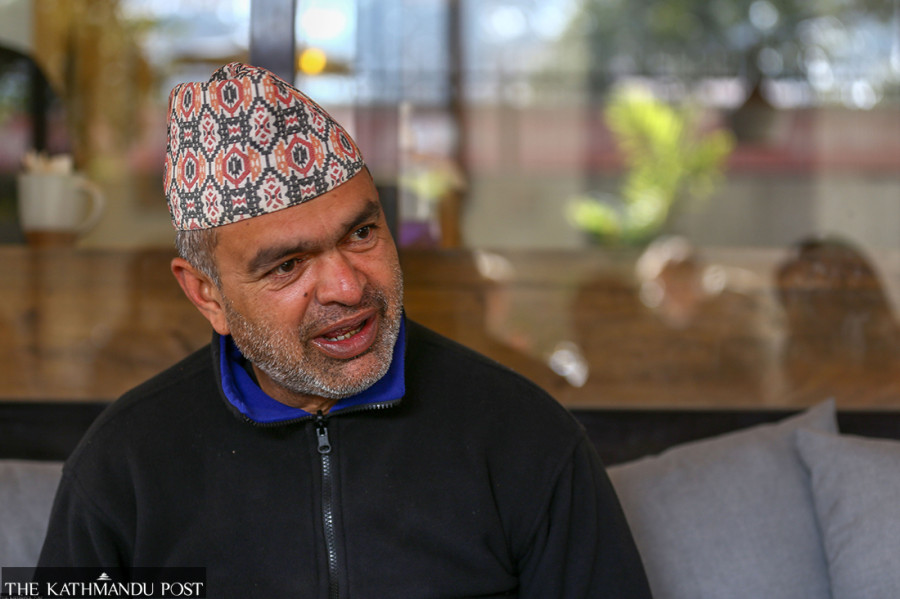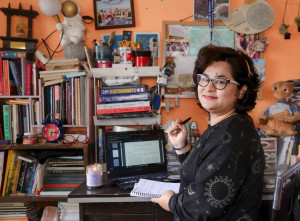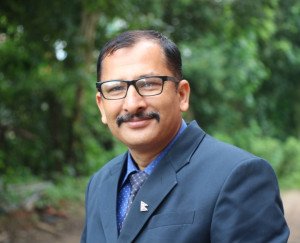Culture & Lifestyle
Ujjwal Bikram Thapa is not stopping anytime soon
In the last seven years, Thapa has helped hundreds of burn victims get access to medical treatment and has lobbied with the government and non-government organisations on behalf of the victims.
Pinki Sris Rana
A few days ago, Ujjwal Bikram Thapa was celebrating his 53rd birthday with his family members when he received a call about a child who had accidentally fallen into a fire pit. After the call, Thapa left his birthday party and was gone for almost six hours to arrange medical treatment for the child.
Since 2015, Thapa has dedicated his entire time to helping burn victims get access to medical treatment and lobbying with the government to put in place stricter regulations on acid sales in the country and free medical treatment for burn victims.
“During winters, I get swamped with calls from family members of burn victims. When temperatures drop, people who cannot afford warm clothes and heaters resort to huddling near fires to keep themselves warm. As a result, most fire-related accidents in the country happen during winters," says Thapa in his deep-toned voice.
According to a 2018 report published by World Health Organisation (WHO), burns are the second most common cause of injury in rural Nepal. In a country where a large majority of the population still depend on firewood to cook food, flame burns are inevitably the most common form of injury. Since the majority of burn victims in the country come from economically disadvantaged backgrounds, they often cannot afford the necessary medical treatment.
Since 2015, for the many burn victims from across the country who end up in Kathmandu to get medical treatment, Thapa has become the most common name to reach out for help. In these seven years, Thapa has also reached out to hundreds of burn victims admitted at hospitals in Kathmandu and struggling to afford medical treatment. “When a person comes to Kathmandu for medical treatment, they normally feel lost and alone,” says Thapa. “My work is to let them know that they are not alone.”
For 53-year-old Thapa, social work was something he was exposed to very early on in his life. He grew up seeing his father, Mohan Bikram Thapa (a native of Sindhuli), help fellow villagers coming to Kathmandu for various works.
His father’s way of helping those in need left a lasting impression on young Thapa’s minds, and he also started doing his bit to help the needy. But how he did it was perhaps something his father didn’t quite agree with.
“As a boy, I would steal money from my father and then give them to the needy people who lined up in front of the then Ratopati in Kamalpokhari. One day, someone my father knew caught me red-handed and ratted me out,” says Thapa, reminiscing the old days.`
The Kathmandu that Thapa grew up in was a small town, and people at the time, he says, had limited dreams. “Growing up, I wasn’t very ambitious and didn’t have lofty goals. Earning a lot of money and accumulating material wealth were things I was never really interested in,” says Thapa. “My parents were both well educated, and they placed a lot of importance on education. And to ensure that I get the best education, I was sent to St Xaviers, Jawalakhel, where I finished my primary level schooling. I completed my high school from Sherwood College in India. And then I went to the Philippines to study electrical engineering.”
In his late twenties, Thapa decided to volunteer at what is now known as Kalighat Home for the Dying, a hospice for the sick and dying. It was formerly known as Mother Teresa's Kalighat Home for the Dying Destitutes.
“During my time at the Kalighat Home, I saw what immense pain and suffering looks like for the first time. During my initial days there, what I saw left me traumatised. But once I began to look past the physical suffering, all I saw was the beauty in humanity,” he says.
Back in Kathmandu, Thapa tried his hands in several businesses but always kept himself involved in some form of social work. But it was when he turned 46, Thapa decided to quit his business and focus fully on social work.
“I just followed my heart. It made perfect sense for me to get into social work because my children were already doing quite well for themselves, and I no longer had the financial responsibilities I once had. Back then, I drove a fancy Toyota four-wheeler, but now I drive a Mahindra Bolero, which also functions as an ambulance when needed,” says Thapa.
Today, Thapa closely works with four hospitals: Teaching Hospital, Kritipur Hospital, Sushma Koirala Hospital, and Kanti Hospital. The management team from the hospitals reach out to Thapa when they come across burn victims in need of financial help.
After seven years of seeing human sufferings day in and out, Thapa says he is still not used to things and that it does get hard sometimes.
“Sometimes, the emotional toll gets to you. That is why, four years ago, I decided to keep my phone on silent mode from 10 pm to 6 am. On days when things get so overwhelming, I do feel like leaving everything. But I don’t think I have that choice any longer. People already know me for what I do, and a lot of people come to me in the hopes of getting some form of help. Leaving social work would mean abandoning the hopes of many who come to me.”
In 2020, after years of dedicating his life to helping burn victims, Thapa was awarded the Social Service Medal. But he did not receive the award until the bill focusing on regulation of acid sales and free treatment for acid attack survivors was passed.
The awards and recognitions from government and non-government bodies, says Thapa, do not motivate him to continue his works.
“Some of the burn victims I have been able to help live in such remote parts of the country where cellular networks are unreliable. Yet whenever they get access to a reliable cellular network, they call me and ask about my well being. Such gestures are what motivates me to keep continuing what I do,” he says.
When Thapa is not meeting burn victims and offering them support, he lobbies with government and non-government actors on behalf of burn victims. Thanks to his relentless work, Palpa Cement recently agreed to provide Rs six million to Sushma Koirala Hospital, one of the few hospitals in the country equipped to provide complex medical treatment to burn victims. The hospital will use the fund to provide free of cost treatment and medicines to burn victims below the age of 18. The hospital also announced that the burn victims and one of their attendants are entitled to free accommodation while seeking medical treatment at the facility.
“I see a lot of our youngsters posting beautiful photos from their treks and hikes and captioning their photos ‘Heaven is myth, Nepal is real'. But what I say is, Nepal is beautiful from afar, but if you see it upclose, you will see so many unpleasant things but there aren't many people out there working to improve things,” he says.
Thapa says that it’s important for the younger generation to see the real Nepal, empathise with those suffering, and hold those in power accountable.
“I hope to continue working until the government feels ashamed of its apathy towards burn victims,” says Thapa. “It is the government's responsibility to provide basic human rights to the burn victims, but the government has failed miserably. And that is why voices like ourselves should be in alliance with the common people.”




 17.12°C Kathmandu
17.12°C Kathmandu













%20(1).jpg&w=300&height=200)

